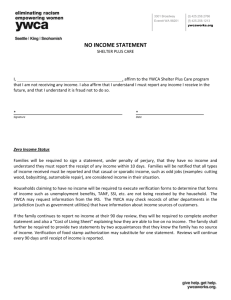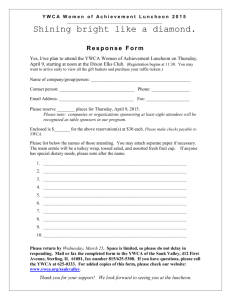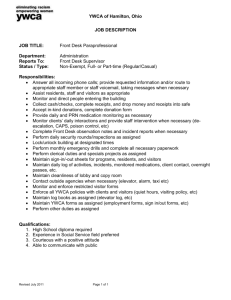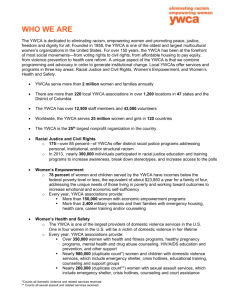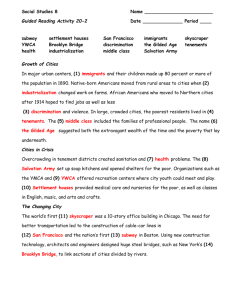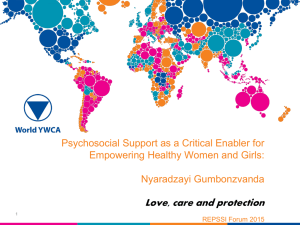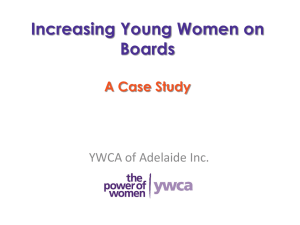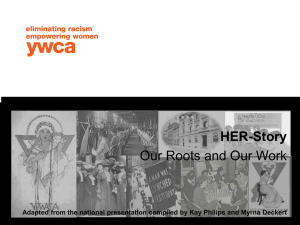imposing evidence
advertisement
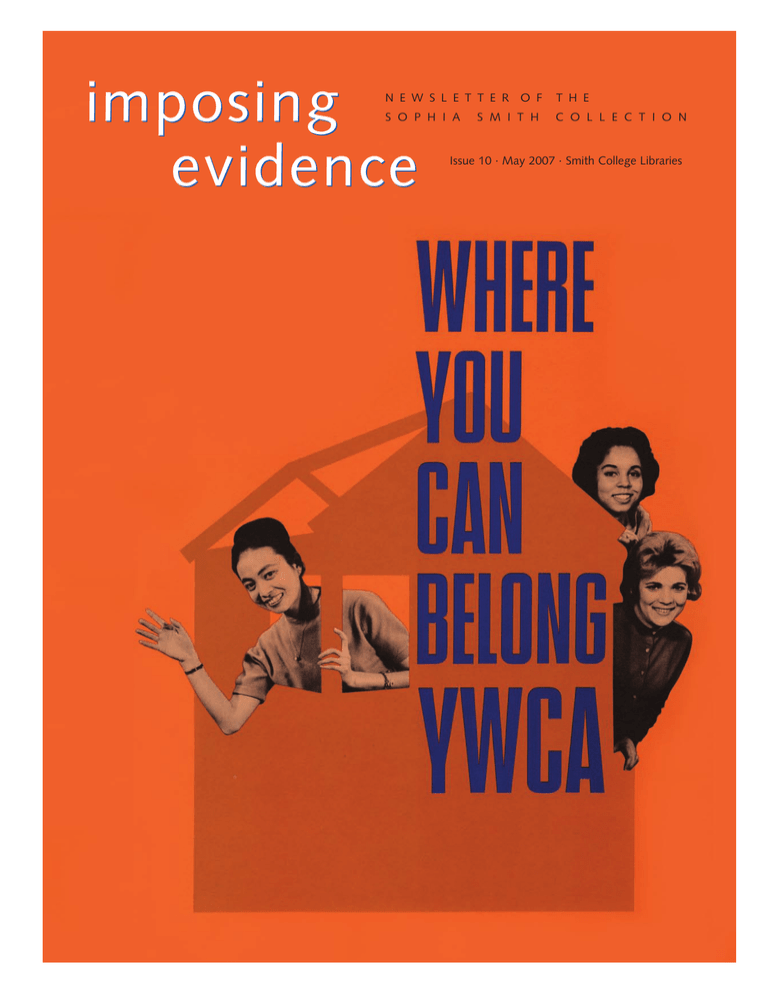
imposing evidence N E W S L E T T E R O F T H E S O P H I A C O L L E C T I O N S M I T H Issue 10 · May 2007 · Smith College Libraries Sophia Smith Collection Greetings from the Director Women’s History Manuscripts at Smith College Y A Smith College Northampton, MA 01063 telephone: 413-585-2970 fax: 413-585-2886 e-mail: ssc-wmhist@email.smith.edu Web site: http://libraries.smith.edu/libs/ssc The Sophia Smith Collection is an internationally recognized repository of archives, manuscripts, photographs, periodicals, and other primary sources in women’s history. It was founded in 1942 to be the College library’s distinctive contribution to Smith’s mission of educating women. Named to honor the founder of Smith College, today, the Collection consists of over 8,000 linear feet of material documenting the historical experience of women in the United States and abroad from the colonial era to the present. Imposing Evidence (ISSN 1524-9972) is published annually (more or less). Visit our Web site or contact us by mail for more information about the Sophia Smith Collection and to learn how to help support our mission. Please recycle this newsletter by passing it on to a friend or donating it to a school or library where it might be read with interest. Staff: Sherrill Redmon, Director Kelly Anderson Susan Sanborn Barker Susan Boone Joyce Clark Follet Maida Goodwin Amy Hague Margaret Jessup Karen Kukil Y-Teen brochure, Jinny Mason late 1940s. Loretta Ross Burd F. Schlessinger COVER: ou may already have noticed that this issue of Imposing Evidence has a theme—the YWCA. For the past five years we have been wrestling the 800-pound gorilla that is the archives of the YWCA of the USA into submission. At last (ta da!) it’s time to break out the virtual champagne and share some of the yield from all those cartons and volumes. Needless to say, processing a collection that would occupy nearly 100 file cabinets took funding partners and many hands. The funding arm of the National Archives, the National Historic Publications and Records Commission, recognized the historical importance of readying this key source for the study of women’s history and generously provided the bulk of the funding. We were also aided by a bequest from long time YWCA librarian/archivist Elizabeth Norris ’36, whose efforts were key to the collection’s preservation and care in the YWCA’s New York offices and ultimately to its transfer to the SSC. We also tapped the new Studwell Endowed Fund to support an internship. Stalwart Project Archivists under the supervision of Curator Amy Hague—first Kara McClurken and later Maida Goodwin— worked full time for more than two years to arrange and describe the 383 reels of microfilm and 575 feet of office files, photographs, publications, and audiovisual materials. A task of this volume and complexity would have been utterly impossible without a steady stream of willing and capable interns and student assistants. Our deep thanks to Amanda Izzo, Melody Sabine, Kristine Reinhard, Sharon Davenport, Corey Borenstein, Keely Richter, Sally Reede-Morris, Elizabeth Crews, Linda Albright, Leah Gross, Michelle Medina, Jennifer Hartwell, and Meghan Banach. The opening of the archives of the YWCA USA is only one thing we are celebrating in 2007. Turns out it’s time for another gala SSC birthday party. Mark your calendars for a conference, “The Power of Women’s Voices: Celebrating 65 Years of Collecting Women’s History at Smith College,” to be held September 28–29, 2007. Speakers will highlight opportunities ripe for further investigation in the YWCA records and we will hear from three narrators from the newly opened Voices of Feminism oral history project. There may also be a musical surprise or two. Stay tuned. On a more sober note, we warmly remember three departed friends: Susan Grigg, SSC Director, 1985–92, and two of our collection donors and strong supporters, social work educator Louise Silbert Bandler and author Ernestine Gilbreth Carey. Membership recruitment poster, c. 1962. All illustrations from YWCA of the USA Records — Sherrill Redmon Gems from the Stacks — Y.W.C.A.Edition T he YWCA is a challenging organization to describe. Since its founding in the urban industrial centers of mid-19th-century England, it has been chameleon-like, adapting its focus, programs, and methods to suit the needs of different times and places. Though the relative importance of the “Y” and the “C” in its name have waxed and waned over the years, it has always been primarily about Women and about the strength derived from working in Association with others. In many people’s minds, the YW is probably most closely associated with cheap lodgings and swimming pools, but, in the words of the World YWCA, it is a worldwide movement seeking to “develop the leadership of women and girls . . . to achieve human rights, health, security, dignity, freedom, justice and peace for all people.” The “C” in YWCA is firmly rooted in the long tradition of liberal religious activism which emphasizes the compassion and egalitarianism of Jesus’ insistence that every person counts. The Association’s Christian purpose provided “the dynamic and unifying power for its work as well as the criteria for the making of policy and program.” This regularly lead the organization into involvement in politically controversial issues such as fair labor practices, the rights of refugees, civil liberties, racial inequality, and women’s rights. This interpretation of Christian duty also manifested itself in a “concern for women everywhere, so that associating is not merely with members of one’s family, one’s social class or church, or even with one’s nation or From "An Adventure Book for Younger Girls," 1927. Drawing by Lynd Ward for the 1934 Convention. race.” The aim, as expressed at the 1920 Convention, was to bring “abundant life to all.” As early as 1925, a report titled “Industrial Work in the YWCA: Principles and Policy,” acknowledges that “a fellowship of diverse individuals and groups, is difficult to make real.” And those difficulties have required periodic rededication to the effort. The historical records of the YWCA of the USA chronicle the struggles and successes of the U. S. national branch of the World YWCA. The National Association is the “servant and prophet of the local YWCA.” Its program and policies are determined at the grassroots through various meetings and periodic Conventions of local YWCA members. National staff and committees devise ways to “put Convention actions into living form.” The YWCA Records are a chronicle of their dedicated and creative work. After two and a half years immersed in them, we knew that it would take an entire issue of Imposing Evidence to give even the smallest taste of the amazing and unexpected things contained in the nearly 600 feet of records. — Maida Goodwin, Amy Hague, and Amanda Izzo The International Board of Women’s Christian Associations was one of the two organizations that merged in 1906 to form the YWCA of the USA. Founded in 1871, it was a rather informal confederation of WCAs and similar organizations located mainly in cities in the eastern U.S. and Canada. At its biennial conferences representatives reported on their Associations’ activities and methods and heard inspirational addresses. The following excerpt is from “Rescue of Fallen Women,” a speech delivered at the 1877 Conference by Mrs. A.B. Leslie of the Cleveland Association. Rescue of Fallen Women From the moment that the exquisite harmony which man’s soul had as it came from the work-shop of God, was disturbed…the foul stream of prostitution had its rise. . . . It is an affecting and fearful consideration, that in this life rising is unknown. It is all descent. A boy, even in the lowest grade of thievery, comes to be a clever pick-pocket, and finally arrives at notoriety; but in prostitution the tendency is all downward, no matter where the starting point may have been. . . . I speak of the slaves of the pavement. And in their slavery we find our greatest hindrances to success in reformation. They belong, in the first place, to the devil in human shape who owns the den the wretched harlots call home, and even the clothes they wear. . . . An utter hopelessness seems to be the fate of the poor creature who departs from virtue. This is partly the result of the nature of woman; it is increased tenfold by the position society takes with regard to her. Every avenue of return is blocked; an outcast from home and all pure associations, barred from all religious influences, she can only drug her conscience and drown in despair and recklessness. . . . In overcoming the evil of prostitution, as its sister evil, intemperance, we must get to the very root of the matter—in the heart. We must show that a change in the whole tenor of life is needed; we must supply new motives, new principles. Moreover, cold morality can only say to the erring woman, “Come up where we are;” Christianity goes down and seeks out the lost and lifts them up to a higher level; and women, to have influence over the fallen, must approach them in the spirit our Lord ever showed to sinners. It is not great means or great talents that are required. It is simply a pure, generous, Christ-like love—a love which will go down to the lowest depths . . . a love which will think no labor too heavy, no waiting too long, no anxiety too exhausting, no trial of patience too severe, if in the end it can see one soul snatched from the destroyer and led safely along the heavenly road. . . . New Americans One of the true glories of the YWCA Records is the reports written by national staff during the first 30 years of the Association. As varied in style as the “Secretaries” themselves, they range from rather dry and business-like lists of accomplishments to highly evocative descriptions of internecine Association politics or appalling living and working conditions, to the occasional verse. The excerpt below is from Edith Terry Bremer’s report to the City Committee on the fledgling work among immigrants in the fall of 1913. Invitation to a reception at the 1879 conference of the International Board. I have made no report of things in Lawrence, Massachusetts, since outlining the situation that lead to the conviction that immigrants must be helped. In June the Association secured Miss Aimee Sears to be their immigration work secretary . . . They followed the plans worked out for them and called two foreign speaking workers, one, Irene Isaakides, a Greek, who looks an Italian and, who speaks four languages, and the other a LEFT: Cover of a fund-raising pamphlet for the New York City YWCA International Institute, circa 1913. BELOW: Edith Terry Bremer (left) and the staff of the Brooklyn YWCA International Institute, circa 1926. Polish American girl, Katherine Wojiesich. Both of these young women came from the Springfield International College. It was necessary in starting to compromise on the question of location. It seemed to me that the International Institute must locate within the district where the foreigners lived and that it must be in a small house of its own—in order to begin on a neighborly basis and to establish, as soon as might be, its own identity. The committee, however, has been persuaded into taking rooms in a cooperating scheme in a building to be used for City Charity, Visiting Nurses, Catholic Relief, and Milk Station. Miss Sears wisely compromised. The result was however that within two months the Institute was permanently settled in the foreign district and in its own little house. Miss Sears and her two assistants live there and already the house is widely known amongst all nationalities. People drop in all day long, at noon, and on the way home from work in the evenings—if only to sit and see what is going on—men, women and children. . . . The Massachusetts law which compels all non-English speaking to attend night school until twenty-one years old means that the girls whom the Institute reaches who are under twenty-one have to be taken to city night schools. We have to be careful to keep the people from mistaking the Institute visitors for truant officers. The compulsory education law unexplained appears to them a kind of oppression that they bitterly resent. World Fellowship Progressive era ideas combined with feminist principles influenced the mission of the National Association’s international work from its earliest days. U.S. Secretaries were sent abroad to assist in founding “self-supporting, self-directing and self-propagating national movements.” Experience working side-by-side with indigenous colleagues convinced American YWCA secretaries of the “limitless potential for women’s contribution to the development of their countries if they could have access to the tools and training from which most have heretofore been excluded.” It also prompted them to view their work in a political context and reinforced the National Association’s progressive stance on international issues. This excerpt is from a letter written by Ella Bennett from Peking relating her early impressions to Anne Guthrie, World Fellowship Chair of the Chicago YWCA, which had “adopted” Ella for 1926. I am such an infant in China that I am still very much in the stage of being educated myself and I doubt if I will ever get out of that period here. I hope not. . . . When we made our first stop in Japan after ten days on the water we certainly got a real thrill out of the circular, round the world wave that we could see on the docks even while we were still far from land. To have friends there made China seem not quite so far away. And we have discovered that the Y.W.C.A. really is a world family. . . . This year my main business is learning the language so I do not have a great deal of contact with the Chinese RIGHT: Ella Bennett’s passport photograph, August 1925. BELOW: Worship service in a bamboo grove, YWCA Girls Camp, Chengdu, China, 1940. Photo by Ella Bennett. Industrial work pamphlet, 1915. Industrial Writing Group people. Twice a week, however I teach four girls English in the Association. Their eagerness to learn is all the inspiration I need. One of them is getting ready to come to America to study nursing, another plans to study to be a nurse here in China, the other two want to go on with their education. Two of them are Christian and two do not call themselves Christians. At Christmas time we had such an interesting discussion which brought out quite clearly the attitude of a good many towards Christianity. They are measuring those of us who call ourselves Christians up to the teachings and life of Jesus as they study it in the records and they do not always find that it tallys! As one of the girls said, there seem to be two kinds of Christianity, that held by individuals as such and that held by individuals who have governmental authority and responsibility and the latter is more often nationalistic than Christian. I feel more keenly than ever that our work here in the future will be helped or hindered by the attitudes of our governments. So in a very new and real sense world fellowship does begin at home. Summer YWCA Conferences for working women offered “a chance for a real vacation.” Mornings were for lectures and discussion groups on issues of interest to workers, on social and religious concerns, and on other YWCA topics. Afternoons were for recreation, and evenings for skits, concerts, “devotions,” and campfires. The piece printed below by Margaret Harlan Hilton of Richmond, Virginia, is from a mimeographed compilation of works by the Writing Group at the 1931 Southern Industrial Conference. In her foreword, group leader Jean Grigsby Paxton writes “This year most of the ideas that the members of the group wanted to put into words came out of their own experiences. . . . [W]hatever the cause, there runs through this little book . . . the somber colored thread of the seamy side of the worker’s life. The wear and tear of life at Woolworth’s information desk, one girl’s idea of what unions can mean, the indelible impression on brain and nerve centers of a machine’s tearing a hand off; these are pictured by girls who saw and felt them. They are true, as true as girls could make them.” WASHING MACHINE She had been doing day’s washing in the ladies’ homes now for half the years of her life. She could have furnished scientific data on washing. She knew the quality of dirt. Japanese Evacuee Project There was no rubbing and looking with her. She could give the garment a glance and go on thinking about something else. When the U.S. government ordered the evacuation of Japanese-Americans from the Pacific Coast into “Relocation Centers” during World War II, the YWCA and its Japanese-American staff set up temporary Associations in the centers to provide educational and recreational opportunities for internees. In this “UNOFFICIAL!” letter, Dorothy Takechi, from the Los Angeles YWCA writes about her frustrations establishing the YWCA at the Granada Relocation Center in Amache, Colorado. Her mind didn’t have to wash clothes any longer. December 8, 1942 At Mrs. Catsby’s she could even look out the window and watch the pine woods back of the house. Dear Kay: She knew how many rubbings it took to cleanse a pair of children’s rompers, twenty on one side, souse and turn; twenty on the other: how many for one of Miss Lipscomb’s tiny silk bloomers, six soft swishes and a couple of squeezes. She knew how hard the pressure had to be on one of Johnnie Catsby’s shirts and how to ease up her hands on one of the baby’s dresses. Mr. Catsby was thinking of getting an electric washer. She wondered whether Mrs. Catsby would be able to teach the machine these things. It was a shame to waste all the eighteen years she’s spent learning to wash. Someone ought to be able to use what she knew about washing. From day to day life seems to get more and more disolusioning [sic] and when one is good and ready to give up then life decides to perk a little and set you going for another few weeks—which all adds up to nothing special. Our Y.W.C.A. is getting along slowly but surely and gaining more and more recognition by the right bodies. We (D.T.) have attended all the coordinating councils RIGHT: Industrial Department pamphlet, 1928. ABOVE: Letterhead for Hospitality House at the Granada Relocation Center, Amache, Colorado, 1944. BELOW: Group outside the YWCA at the Manzanar Relocation Center, Manzanar, California. (the people who meet don’t know what it is) meetings—spoken at the Y.M.C.A. Leadership meeting (just started Sunday—at first they didn’t know whether to call it a Y.M.C.A. or not, seeing that the National was so intent upon winning the war): and now the latest development is the bickering of the Protestant Ministerial Body and other groups on the distribution of Christmas gifts—nuts—they all want to be the important I AM—heck they don’t even know the meaning of Christmas. Then comes a little bit of back stabbing from the Rev. K. (Holiness) as to the Y.W. golly, who ever thought up the ministers? When you come—I shall give you the full details which are pretty disgusting. Mr. Johnson and I spent a little time today commiserating on the “smallness” of people—we are in sympathy with one another. Why did God make us so dumb and uncooperative? By this time this letter is so weepy and mad that if it gets through the U.S. P. O. it will be a miracle. Her most vicious attack was on Rose Terlin and referred to the organisations with which she was connected and stating that it was known that she was a member of the communist party. When I asked Mrs. Schlafly how she knew this, she evaded the question. She asked for copies of the Woman’s Press magazine and numbers for the past three years, [which] were produced by the [Alton] Executive Director, who did not know for what purpose they were wanted. She is also new in Alton and was as unprepared for this attack as I was. Mrs. Schlafly said she was glad to see that Rose Terlin was no longer the editor of our magazine, but she saw no difference in the articles. She said that the magazine did not present all sides of questions—only one. She said that the articles urged the United Nations to recognize Red China, urged the adoption of the Point Four program and urged everything that meant higher taxes. How then, she argued, could voluntary organisations be retained if taxes continue to rise so that people have no money to support them? . . . Love, Dorothy Schlafly proposed that the Alton YWCA institute a loyalty oath for its staff that read: The Red Scare I believe in the American system of individual opportunity, private property and an economy free from governmental control and ownership. I will endeavor to realise the ideals of personal and social living to which I am committed by my faith as a Christian. In 1951 Phyllis Schlafly used her platform as a young member of the board of the Alton, Illinois, YWCA to attack the national organization for “communist tendencies.” In this report, national staff member Dorothy Nossett describes Schlafly’s grievances against the YWCA’s political advocacy and its employment of Rose Terlin, who had been named as a member of the Communist Party before the Dies Committee in 1939. (Terlin testified against the accusation, was never charged with a crime, and continued to be employed by the YWCA). Ultimately, the Alton YWCA disassociated itself from Schlafly and her critiques; by the 1970s, Schlafly had become a leading voice of conservatism. Her organization, the Eagle Forum, helped fight passage of the Equal Rights Amendment and continues to promote “pro-family” policy. Nov 19, 1951. Confidential. To: Mrs. Forrest Anderson From: Dorothy Nossett, Department of National Support I do not believe I have spent a harder two days than those in Alton, Illinois. Mrs. J. F. Schlafly Jr., Finance Chairman, young—in her late twenties—attacked the YWCA because we were “pink,” we had communists on our staff and she said Alton did not want to send money when it was spent that way. The Board rejected her proposal. Young Women Committed to Action After World War II, a variety of factors both within and outside of the Association contributed to declining membership, particularly among young women. By the late 1960s, they no longer perceived the YWCA as “relevant” to their struggles and concerns. In addition, changing social norms and the widening “generation gap” made communication particularly challenging. In this April 1969 “Program Memo,” Young Adult Program Consultant Faye Aaker urges YWCA staff, members, and volunteers to “tune in” and “think young.” ARE WE IN IT? I must speak to you from an impatient posture. With URGENCY. TODAY. We are the YOUNG WOMEN’S ABOVE: This 1948 pamphlet by Joseph P. Kamp subtitled “A Report on the Extent and Nature of the Infiltration by Communist, Socialist and Other Left Wing Elements, and their own destiny. TODAY—NOW—IN AMERICA—WE ARE SEPARATE SOCIETIES. the Resultant Red Complexion of Propaganda Disseminated In, By and Through the Young Women’s Christian Kids are dying TODAY from drugs. Association” was one of the most widely distributed Red Scare era attacks on the YWCA. RIGHT: From the February Have we given them a reason for living? 1970 Program Memo to Staff about the first National Young Adult Conference, November 1969. Christian Association. We have a moral responsibility to be concerned with the needs of YOUNG WOMEN in our communities, in America TODAY. Are we in it? Are we within the thinking, the feeling, the actions, of the YOUNG in our communities, in our nation, TODAY? In a Peace Conference recently, the young were there. To heckle. To confront. To challenge. “Why are you eating in this expensive dining room? Why are you sitting on panels? Why are you talking? Why aren’t you DOING?” A report from a YWCA meeting claimed that a young black shouldn’t have been there. “She didn’t participate.” Why? Did we hear what she wasn’t saying? Were we tuned in to her? To her age? To her posture? How do we honestly feel about Afro-haircuts, bare feet, short skirts, shacking up, confrontation, pot, the uncommitted young, student power, Welfare Mothers Organized for Change, Black Power? Are we able, willing, to debate with the young? To hear? To be confronted? To confront? To DO? I’m impatient with the young who heckle and do nothing. BUT. In the chaos, the confusion, the anger, the pain, of participating in the setting up a community school in a black ghetto, I have experienced in the gut . . . Black separatism. the despair of the poor. Intelligent young blacks who are educationally retarded. Black parents who have not been able to assume the responsibility of THE YWCA HAS THE RESPONSIBILITY IN OUR COMMUNITIES FOR CONCERN WITH THE NEEDS OF YOUNG WOMEN AND GIRLS. THINK YOUNG The YWCA’s initial approach to work with its African-American members was to establish separate “Colored” branches and programs under the auspices of a city’s main YWCA. By the mid-1910s and especially after World War I, the National Association and its Black staff came to believe the only effective way to improve conditions for Black women was to address America’s race problem directly. Work that had been done “side-byside but not together,” evolved into “interracial” work with the adoption of the YWCA’s Interracial Charter in 1948. Two decades later, impatient with the slow progress toward meaningful integration within the organization, 500 Black women met just prior to the 1970 National Convention and formulated a resolution to present to the full YWCA membership. The following excerpt is from the report on that conference given at Convention by its co-chair Ellen Dammond on April 14, 1970. The resolution was adopted the following day and continues to this day as the YWCA’s “one imperative.” The One Imperative [I]t was imperative that black women in the YWCA convene in a national conference to develop strategies by which we could become more deeply involved in the YWCA . . . to enable us to shape the communities in which we live and carry on YWCA program and services. Five hundred women responded. . . . We took seriously the words of our Work Book and Call to Gather which call upon this convention to dare not do business as usual—which call upon the collective conscience of women to risk, to labor, to transform, to respond to change, to change in response, to give living testimony to goals not yet realized. . . . We, the black women of the YWCA, are determined that this convention take responsibility for the fulfillment today of our purpose which declares that the YWCA of the USA, a movement rooted in the Christian faith . . . seeks to respond to the barrierbreaking love of God in this day. This Association draws together into responsible membership women and girls of diverse Conference flyer, 1970. experiences and faiths that their lives may be open to new understandings and deeper relationships so that together they may join in the struggle for peace and justice, freedom and dignity for all people. We find this is not a difficult demand to meet. We call it doing what we say we are all about, living up to all we declare ourselves to be. We cannot wait—the here and the now of our reality is pain filled. Deeds must match words. . . . We are solidly united in determination to close the gap between the YWCA ideals as stated in the purpose and YWCA practices. We will no longer tolerate false liberalism. . . . Recognizing that the YWCA cannot be all things to all people, we demand that it put its full force behind one issue inherent in all of the imperatives stated in the 1970 Convention Work Book. Ellen Dammond at Convention, 1970. Photo by Carolyn Litowich. That imperative is the elimination of racism wherever it exists and by any means necessary. 2006–07 Grierson Fellowships Oda Cordes, University of Hannover, Germany “The Juridical Conceptions of the First Female Jurists in Germany about Family Law” Patricia Rosof, Independent Scholar “A Study of the Career of Dr. Florence Rena Sabin” Jennifer Scanlon, Bowdoin College “Gurley Girls: Helen Gurley Brown, the Single Girl, and the Contested Nature of Second Wave Feminism” 2006-07 Bain Fellowships Kyla Schuller, University of San Diego “Eugenics and the Color Line” Patricia M. Ulbrich, University of Pittsburgh Creation and evolution of the Ms Foundation for Women as a social movement organization Emily M. Westkaemper, Rutgers University “Martha Washington Goes Shopping: Mass Culture’s Gendering of History, 1910–1950” Belinda Wheeler, Indiana University Purdue University Indianapolis Lola Ridge Kimberly J. Stern, George Washington University “The Victorian Sibyl: Women, Community, and the Critical Tradition” Stephen Budiansky, Independent Scholar “’The Bloody Shirt’: A Narrative History of the Violent Conspiracy That Ended Reconstruction” 2006-07 Travel Grants John Balz, University of Chicago Birth control clinic expansion in the U.S. from 1922–38 Jocelyn M. Boryczka, Fairfield University “Beyond Virtue and Vice: Towards a Democratic Feminist Ethics” Kaitlin A. Briggs, University of Southern Maine “The Gift from Theuth to Thamus: What Is Writing?” Mary Chapman, University of British Columbia Project: “’Treacherous Texts’: American Suffrage Writing and Modernist Print Culture” Karen M. Dunak, Indiana University Growth of the white wedding celebration in postwar America Melissa R. Klapper, Rowan University “Ballots, Babies, and Banners of Peace: American Jewish Women’s Pre-World War II Activism” Ann Marie Nicolosi, The College of New Jersey “Beauty, Body, and Politics: Comparisons of Female Imagery in the First and Second Waves” Jocelyn Olcott, Duke University “Modern Love: The Politics of Motherhood in Twentieth-Century Mexico” Manon S. Parry, University of Maryland History of international family planning programs developed by United States organizations Sarah R. Payne, University of New Mexico “Cleaning Up after Sex: An Environmental History of Contraceptives in the United States, 1870s–2005” Heartfelt thanks to these special friends of the SSC who made generous monetary contributions since our last issue. Nancy Veale Ahern (Smith ’59) Marylin Bender Altschul (Smith ’44) Caroline Dwight Bain (Smith ’44) Deeana Bates Adele Brawer Baydin (Smith ’51) Ernestine Gilbreth Carey (Smith ’29) Anne Dickinson Chesney (Smith ’48) The Garrison Family Robert Gillespie Sarah Thomas Gillett (Smith ’60) Vida Simenas Grayson (Smith ’57) The Ford Foundation The William and Flora Hewlett Foundation Mrs. Alex Kaemmerer, Jr. Kristina Kiehl Lucia “Kim” Kimber Margaret Mahoney The John D. and Catherine T. McArthur Foundation National Historic Publications and Records Commission The New Jersey Project Elizabeth A. Nichols (Smith ’90) Frances Garber Pepper (Smith ’62) Richard Poaps Catha Grace Rambusch (Smith ’58) The Virginia Gildersleeve International Fund Jane Mead von Salis (Smith ’48) Susan von Salis (Smith ’79) THE POWER OF WOMEN’S VOICE S Celebrating 65 Years of Collecting Women’s History at Smith College Come celebrate the 65th birthday of the S O P H I A on September 28–29, 2007 Smith College, Northampton, Massachusetts S M I T H C O L L E C T I O N Speakers, performers, and exhibitions will highlight recent additions to our collections including the Voices of Feminism, Population and Reproductive Health, and Living U.S. Women’s History Oral History Projects, the historical records of the YWCA of the USA and others. Smith College does not discriminate in its admission policy, programs, or activities on the bases of race, color, creed, handicap, national/ethnic origin, age, religion, sexual orientation, or disabled veteran/Vietnam-era veteran status. Nor does the college discriminate on the bases of race, color, creed, handicap, national/ethnic origin, age, religion, sex, sexual orientation or disabled veteran/Vietnam-era veteran status in its educational policies, scholarship and loan programs, athletic and other school-administered programs, or employment practices and programs. In addition to meeting fully its obligations of nondiscrimination under federal and state laws, Smith College is committed to maintaining a community in which a diverse population can live and work in an atmosphere of tolerance, civility, and mutual respect for the rights and sensibilities of each individual, regardless of differences in economic status, ethnic background, political views or other personal characteristics and beliefs. The following person has been designated to handle inquiries regarding the nondiscrimination policies: Director of Affirmative Action, College Hall #3, 413-585-2141. Sophia Smith Collection Smith College Northampton, MA 01063-0001 Nonprofit Organization U.S. Postage Paid Smith College
